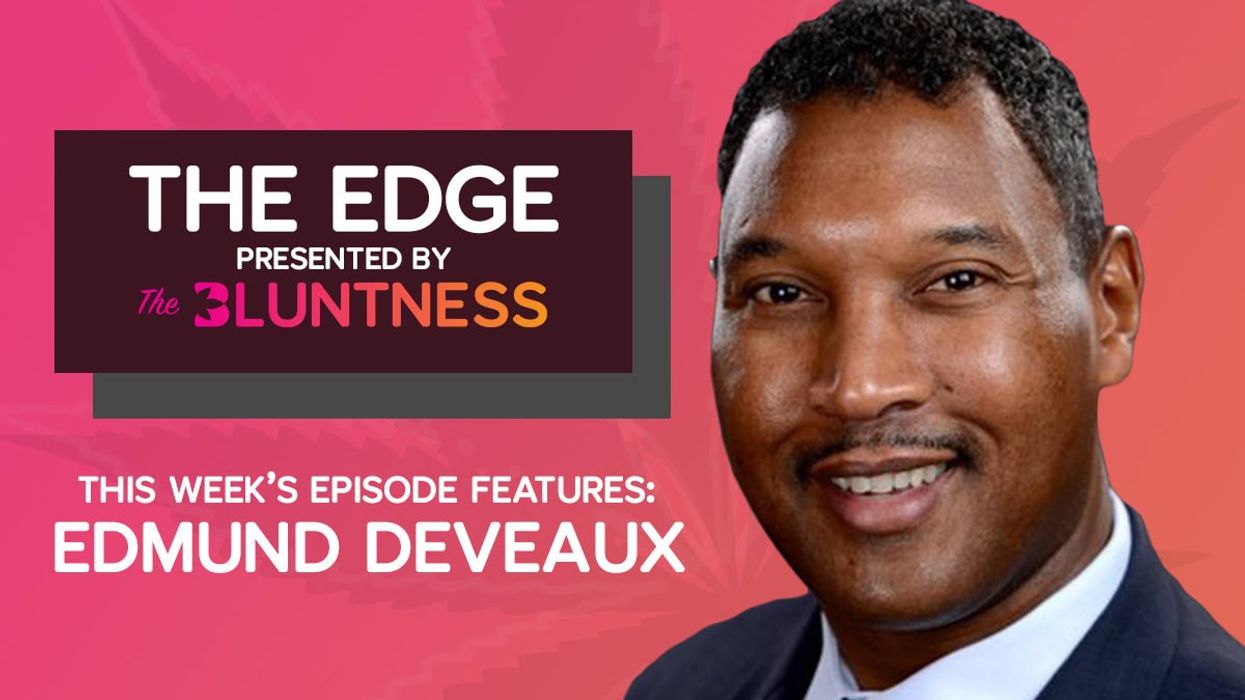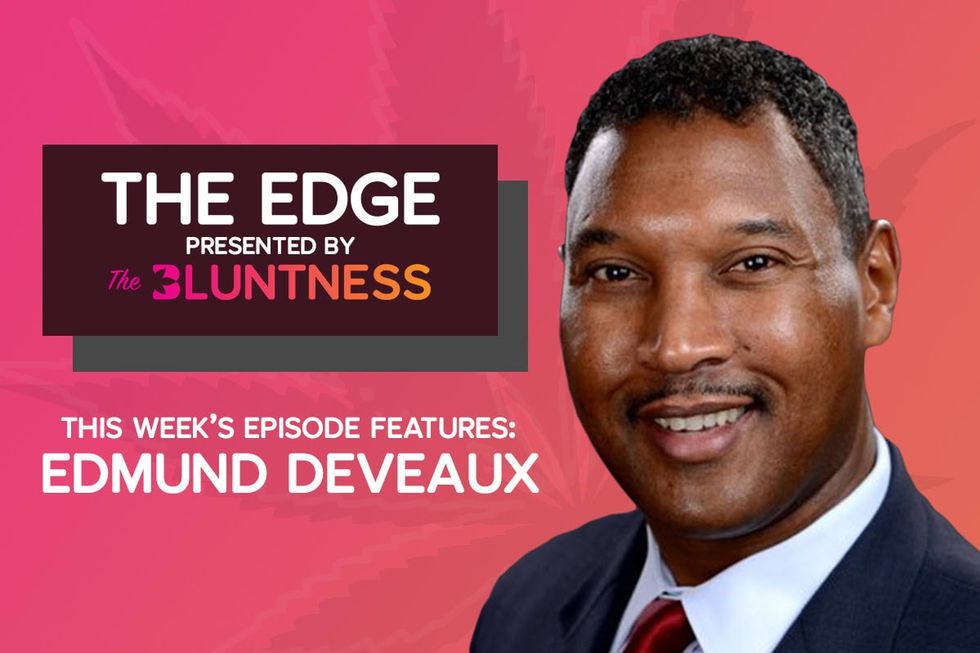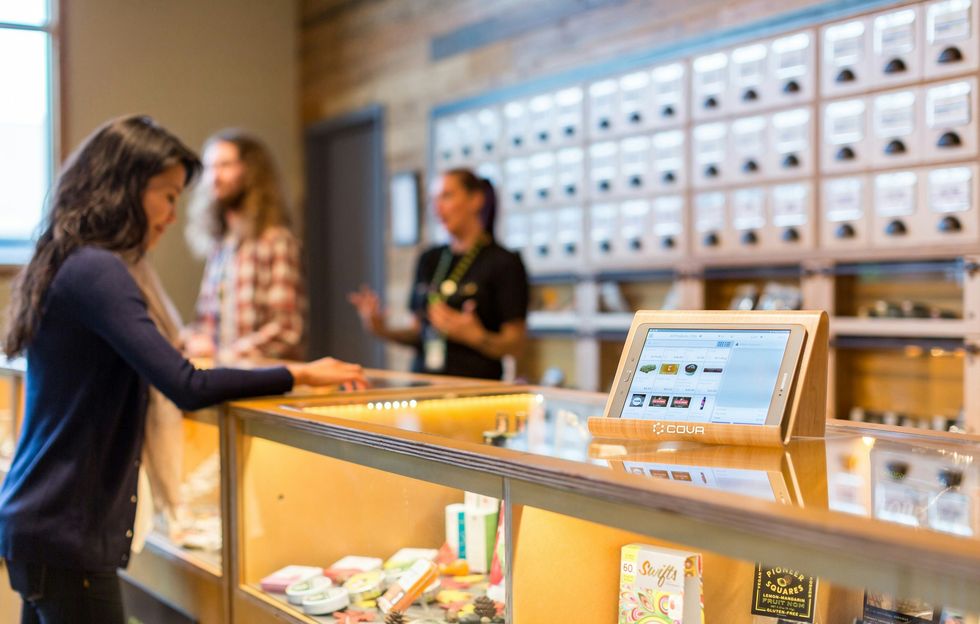When New Jersey voters approved adult-use cannabis on November 3, 2020, it was a pivotal moment in the history of cannabis reform.
Now, the challenge is to establish a responsible and sustainable industry, which will hopefully serve as a shining example for other cannabis markets.
One of the people at the center of this challenge is Edmund DeVeaux, the new president of the New Jersey Cannabis Business Association (NJCBA).
The Bluntness sat down with DeVeaux on multiple occasions (an initial phone interview and a more recent video interview) to discover his values and vision in helping lead NJ’s cannabis industry to great heights.
Building a Responsible & Sustainable Industry
DeVeaux, who has been a part of NJCBA since its inception, got involved with cannabis for one reason: to make sure it was done right – responsibly and sustainably.
Now that cannabis has been legitimized as a business in New Jersey – what does a responsible and sustainable industry look like? As president of the cannabis chamber of commerce in the state, the question is front and center in DeVeaux’s focus.
The answer to this question involves a lot of moving pieces for DeVeaux: addressing the issues of social justice and social equity, educating stakeholders from other sectors such as law enforcement and doctors, creating a free-market model where local cannabis entrepreneurs can thrive, and protecting the local flavor of the state’s supply chain from predatory lending and outside interests.
It’s a lot of work that must be done, as New Jersey grapples with out to rollout their new industry.
Social Justice and Social Equity Issues
Because the war on cannabis tragically and disproportionately impacted so many lives in so many different ways, addressing these wrongs is a critical component in moving forward with a legalized industry.
With social equity measures baked into New Jersey’s new adult-use cannabis legislation bill, it seems the state’s policymakers, whom DeVeaux lobbies and advises, are quite sensitive to this on-going concern.
And while legislation is never perfect, it does provide an opportunity on which to build and evolve.
For DeVeaux, the damage caused by cannabis prohibition is heartbreaking when you look back at the harmful consequences and lost opportunities.
“What if we knew then what we know now? What if we knew then that investment in the industrial prison complex nets you zero profit and zero gain?” DeVeaux says, emphasizing that an overloaded criminal justice system sucks local and state government budgets dry.
“What if we knew then, what we know now? That properly measured doses of cannabis – THC and CBD – actually help combat maladies and diseases like cancer, HIV/AIDS, MS, ADHD, seizure disorders…” DeVeaux notes.
“What if we knew then what we know now, that we could have had a multi-billion-dollar cannabis and hemp industry in place, but we squandered that opportunity from the ‘30s on forward?”
Now we do know all of that. And to DeVeaux’s mind, it’s the NJCBA’s responsibility to help the state pivot and embrace that valuable knowledge.
“We have to be able to pivot all the stuff that we missed over the last 80 years and right the wrongs of a social justice system that was skewed, and actually intent on damaging lives and damaging communities,” DeVeaux says.
“We now get to pivot and create commerce and industry that is suitable for people who were wronged in the past and can actually go forward.”
Now that voters have approved legal cannabis in the state, DeVeaux continues, the social justice discussion and the commercial discussion are no longer mutually exclusive. “You can actually build the commerce, and you can build the industry while adopting social justice reform measures. And it will absolutely benefit the state.”
Uniting a Diverse Range of People and Agendas
One of the most exciting things about an emerging cannabis market is that it creates jobs and opportunities for people of all types of professional backgrounds.
Like most other industries, the cannabis space relies on accountants, attorneys, engineers, IT professionals, real estate people, medical practitioners, and so much more.
For some sectors, however, the conversation isn’t always so easy, especially when the truth of cannabis contradicts much of their previous life’s work.
DeVeaux recalls a few of his pre-COVID speaking engagements, one where he addressed a law enforcement conference, the other where he served as a keynote speaker for New Jersey’s Academy of Family Practitioners Medical Conference.
“At the law enforcement conference, members of law enforcement were very vocal in their opposition to legalization – frustrated because they didn’t have a breathalyzer that told them if somebody smoked cannabis an hour ago versus a week ago,” DeVeaux says.
After the event concluded and most people had left, the conversation afterward played out a bit differently, DeVeaux reveals. The real concern was: “Hey, Ed, how do I have a conversation with students when for the last 20 years, I’ve been telling them this was bad? How do I change my conversation to say that we legalized it because it ain’t all bad?”
Meanwhile, at the medical conference, DeVeaux served as a keynote speaker, talking about the history, the legislation, the New Jersey Department of Health – and all the other important details of the state’s medical cannabis program. “Family practitioners stood up and asked the question: ‘okay, I’m interested, but where is my training?’”
Frustration mounted when DeVeaux explained there was no official training to become a recommending physician.
“However, the conversation after the conversation, was ‘hey, by the way I did register to be a recommending doctor through the Department of Health, but I do need help in understanding what it is that I’m doing, and I do want to know what other doctors across the country are doing’. Great, go to the Department of Health website, they have tons of resource materials listed; you can do this. You’re okay.”
Since then, the NJCBA has signed three affiliation agreements with institutions of higher learning to create professional cannabis curricula for college students, DeVeaux adds.
Overall, specific concerns about legalized cannabis are natural, and there will no doubt be more of them to untangle as the industry unfolds. To DeVeaux’s thinking, it’s important to listen and address these concerns in a collaborative way.
“We’re on the same team. If you’re in law enforcement, I’m concerned about safe driving, too. I don’t promote poor judgment use of any substance. If you’re in the medical community, I get it. I wish we were like Israel, where we could turn to actual research that was done in this country.”
And now, as head of the NJCBA, a big part of DeVeaux’s mission is to unite all these different groups through virtual conferences or in-person conferences when it’s appropriate.
“I want to work with you like any other chamber and bring to bear all of the resources that we have, from either a research perspective, a technical perspective, or an operational perspective, and that’s the neat thing about the NJCBA – we have membership that spans all of that.”
Enabling the State’s Cannabis Economy to Flourish
One of the biggest advantages New Jersey has in following other states that have already legalized adult-use cannabis is the ability to build upon the lessons learned of previously established markets.
“This is a critical time to make sure that New Jersey entrepreneurs have an opportunity to establish business, grow business, and to be productive members of society,” DeVeaux says. “And when I say productive, running responsible, legal business, and contributing to the tax base of their towns as well as the state. And employing people.”
In addition to legislative wins designed to recognize and create opportunities for established groups like disabled veterans, minorities, and women, DeVeaux’s vision for a vibrant cannabis market runs much deeper.
“Micro licenses as opposed to vertical licenses, delivery services, off-site consumption facilities – we’ve got language to help create the framework, to help create the building blocks for those concepts,” DeVeaux says.
Allowing the state’s nascent cannabis economy to flourish also involves protecting it from outside interests or predatory lending. “We want to protect the local flavor and protect New Jersey entrepreneurs. It’s going to be hard for some of them to raise money, and then investor groups will come in to help out for a majority stake in the business,” DeVeaux notes. “My concern is predatory lending. Who is going to be the watchdog over these private financial transactions?”
DeVeaux is also a believer in establishing a free-market system for the state’s cannabis operators. “Let’s not over-regulate through these nonsensical application processes where scoring is arbitrary and people get screwed out of licenses,” DeVeaux says.
“Let’s go to a free-market system where you and I can get together and say we want to open a dispensary, and we put in our application, not to be graded, but where a mayor and council say yes, we approve, and if the local zoning and planning board says yes, we approve – that should be it.”
As New Jersey’s industry moves forward, the NJCBA will be there to assist in developing regulations that benefit New Jersey residents and entrepreneurs from every background.
“I believe that in New Jersey, through growing pains, we will in fact have one of the nation’s greatest programs in place. However New Jersey goes the nation goes,” DeVeaux says.
“We are a great cross-section of what the country looks like, both from a philosophical standpoint as well as an economic standpoint. New Jersey is the place to watch.”
Watch the full interview with Edmund DeVeaux:
Are you still missing out on The Bluntness newsletter? Sign Up today to stay in the loop.








 Justin Timberlake Eye Roll Gif By Agent M Loves Gif - Find & Share on GIPHYAgent M Loves Gifs
Justin Timberlake Eye Roll Gif By Agent M Loves Gif - Find & Share on GIPHYAgent M Loves Gifs







 How to Become a Budtender: Complete Career Guide & Salary Information - The Bluntness Photo by
How to Become a Budtender: Complete Career Guide & Salary Information - The Bluntness Photo by  How to Become a Budtender: Complete Career Guide & Salary Information - The Bluntness Photo by
How to Become a Budtender: Complete Career Guide & Salary Information - The Bluntness Photo by 
